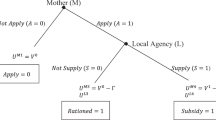Abstract
Claims that states which offer generous welfare benefits attract the poor and that some states pay low benefits intending to drive the poor away are neither uncommon nor entirely unfounded. This paper employs a two player (state) generalized game to model states' choice of a benefit level in the Aid to Families with Dependent Children (AFDC) program. Migration by the poor in response to interstate differentials in earnings and welfare opportunities, and the subsequent changes in AFDC caseloads, drive this game.
Estimation of the model (using 1979 data) suggests that states within approximately 750 miles of each other do engage in a benefit-setting game. The rival's initial number of poor and preference for non-AFDC consumption appear to be the more influential rival characteristics.
These findings, while derived from a different methodological approach, are consistent with previous studies which indicate that welfare recipients tend to move toward higher benefit states. Such migration may impede the efficient spatial allocation of labor. The results also indicate that states will tend to offer lower benefits given recipient migration than would be the case otherwise. State jurisdiction over benefits consequently leads to underprovision of AFDC. Federalization of the AFDC program would improve efficiency in terms of the spatial allocation of labor and the provision of AFDC.
Similar content being viewed by others
References
Blank, R.M. (1988). The impact of state economic differentials on household welfare and labor force behavior. Journal of Urban Economics 24: 186–211.
Craig, S. and Inman, R. (1985). Education, welfare, and the ‘new’ federalism: State budgeting in a federalist economy. Working Paper #1562 NBER.
Deaton, B., Morgan, L. and Anschel, K. (1982). The influence of psychic costs on rural-urban migration. American Journal of Agricultural Economics 64 (2): 177–187.
Debreu, G. (1982). Existence of competitive equilibrium. In K. Arrow and M. Intriligator (Eds.), Handbook of mathematical economics, 697–709. Amsterdam: North Holland.
Gramlich, E.M. (1982). An econometric examination of the new federalism. Brookings Papers on Economic Activity 2: 327–360.
Gramlich, E. and Laren, D. (1984). Migration and income redistribution responsibilities. Journal of Human Resources 19 (4): 489–511.
Moffitt, R. (1983). The effects of grants-in-aid on state and local expenditures: The case of AFDC. Journal of Public Economics 23: 279–306.
Orr, L. (1976). Income transfers as a public good: An application to AFDC. American Economic Review 66 (3): 359–371.
Pogue, T. and Sgontz, L. (1968). The effect of grants-in-aid on state-local spending. National Tax Journal 21 (2): 190–199.
Sjaastad, L. (1962). The costs and returns of human migration. Journal of Political Economy 70 (Supplement 5): 80–93.
Smith, P.K. (1988). Recipient migration and an AFDC benefit-setting game. Working Paper #54. Department of Social Science. University of Michigan-Dearborn.
Author information
Authors and Affiliations
Additional information
Thanks to William Milberg, Herve Moulin, Stephen Sheppard and Richard Steinberg for their comments and suggestions.
Rights and permissions
About this article
Cite this article
Smith, P.K. An empirical investigation of interstate AFDC benefit competition. Public Choice 68, 217–233 (1991). https://doi.org/10.1007/BF00173829
Received:
Accepted:
Issue Date:
DOI: https://doi.org/10.1007/BF00173829




